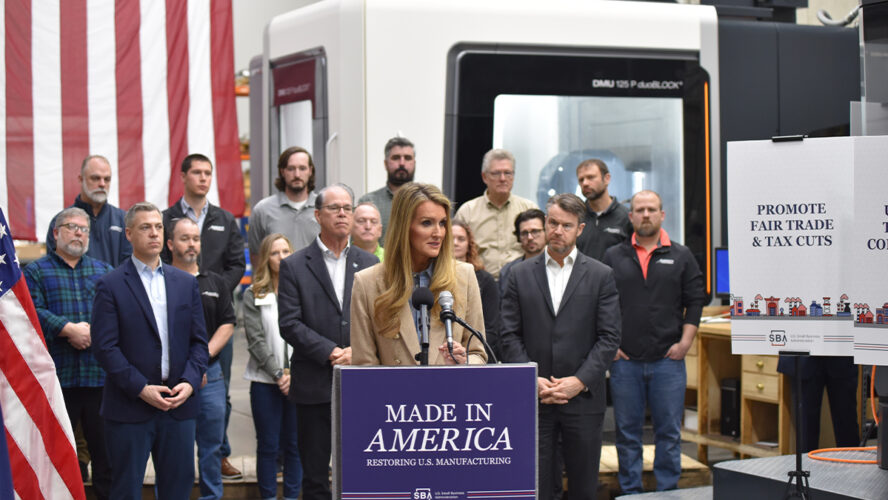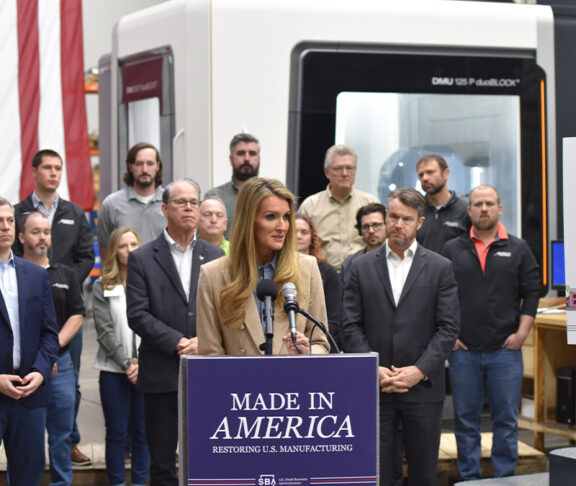U.S. Small Business Administration (SBA) administrator Kelly Loeffler launched the agency’s Made in America Manufacturing Initiative this spring to restore American economic dominance and national security by empowering small manufacturers. The SBA’s effort will support President Trump’s agenda to create good-paying jobs, secure our supply chains, promote fair trade, and bring back the blue-collar boom of his first Administration.
About 99% of American manufacturers are small businesses that are already experiencing a resurgence under the President’s pro-growth agenda. The country gained 10,000 manufacturing jobs during his first full month in office — a swift turnaround after losing an average of 9,000 manufacturing jobs per month in the final year of the previous Administration.
“The great American comeback starts with restoring American industry,” SBA administrator Kelly Loeffler said. “With the Made in America Manufacturing Initiative, we’re slashing red tape, expanding access to capital, and fueling a manufacturing resurgence that will create high-paying jobs and revitalize communities across the country. By prioritizing American-made products, we’re not just securing our economic dominance — we’re protecting our national security by ensuring the essential goods we rely on are produced right here at home. SBA’s initiative is a promise to every hardworking American and small business owner: We’re putting American jobs and strength first.”
The SBA’s plan for growth
As part of the Made in America Manufacturing Initiative, the SBA will:
- Cut $100 billion in regulation through the Office of Advocacy, which is empowered by law to work across federal agencies to identify and eliminate rules, policies, and procedures that disproportionately burden small businesses and manufacturers.
- Launch a Red Tape Hotline for small business owners and manufacturers to share feedback and submit onerous regulations for review.
- Deploy the newly announced Office of Manufacturing and Trade to offer small manufacturers dedicated resources and training in partnership with SBA field offices across the country.
- Reduce barriers to access for the 504 loan program, a zero-subsidy program that provides capital for real estate, construction, and equipment purchases. Zero-subsidy means the program operates without ongoing taxpayer funding and is sustained by borrower and lender fees.
- Expand the use of the 7(a) Working Capital Pilot program, which provides financing to fund inventory purchases and export-related expenses for international markets.
- Promote a skilled manufacturing workforce by partnering with agencies, trade schools, and private sector stakeholders to create a pipeline of skilled workers to support manufacturing.
- Support President Trump’s manufacturing agenda, including tariffs to restore fair and reciprocal trade, tax cuts on domestic production, and 100% expensing retroactive to Jan. 20, 2025, for manufacturers.
One of SBA’s top priorities is a deeper engagement with manufacturing communities where access to capital and federal contracting opportunities have been limited. In collaboration with federal partners, SBA hosted roundtable discussions in various locations throughout the nation this spring.Throughout these sessions, SBA shared valuable information on how small business manufacturers will have improved access to funding, government contracting, and export opportunities through the Made in America Manufacturing Initiative. Additional topics of discussion included how SBA is working to elevate small business growth, job creation, and public and private investments for American manufacturers in each local area.
Visit the Made in America Manufacturing Initiative to learn more.

